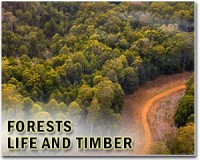| . |  |
. |
Nazareth, Colombia (AFP) March 13, 2011 Just off the Amazon River, lies the village of Nazareth. But don't think about dropping by. Tired of being a curiosity to the outside world, the indigenous people have banned tourists. Thousands of adventurous, backpacking tourists flock to southern Colombia every year, drawn by eco-tourism and the hope of interacting with the peoples who live and commune with the Amazon jungle following age-old traditions. The Colombian Amazon, a peninsula sandwiched between Brazil and Peru, is famed for its spectacular flora and fauna, some of the most varied on the planet. Last year 35,000 tourists poured into the region to swing with the monkeys, swim with the famed pink dolphins that frolic in the Amazon waters or to fish for piranhas. But here in Nazareth, guards armed with their traditional sticks stand ready to deter unwelcome visitors. And the very few who are invited to visit with the community of about 800 residents must register with the guards and show an ID. The village, reached by a 20-minute boatride from the nearest town of Leticia, has been off-limits to visitors for the past two years. Elders say the indigenous people, composed some 80 percent of Ticuna indians, do not benefit from the growth in tourism across the region. "This was a decision taken at an important assembly of the inhabitants," said Juvencio Pereira, an indigenous guard, who stands watch at the guards' cabin. "What we earn here is very little. Tourists come here, they buy a few things, a few artisanal goods, and they go. It is the travel agencies that make the good money." The Ticuna people are one of the most endangered communities on Earth, with the United Nations having counted their remaining numbers at only around 30,000. And they are fearful of seeing their culture eroded by prying visitors. "We had lots of problems. People came, left their rubbish behind, garbage bags, plastic bottles," explained resident Grimaldo Ramos. "Tourists come and shove a camera in our faces," he said. "Imagine if you were sitting in your home and strangers came in and started taking photos of you. You wouldn't like it. "Now the tourists can't just come as they please. They need the permission of the assembly." Nazareth's actions reveal a split among the indigenous communities that live along the river about what role tourism should play in the region's development. With the rise of eco-tourism, the Amazon has seen a flood of travelers arriving to experience the world's most biologically diverse region. According to the Tourism Office for the Colombian province of Amazonas, the 35,000 people who trekked to the region in 2010, represent a five-fold surge in numbers over the past eight years. But as Nazareth complains, the indigenous people have so far seen little of the benefits, mostly just the sharp end of tourism. There are also worries that indigenous children are adopting the speech and dress of these visitors, forgetting the customs of their forefathers. For a tourist interacting with a local may seem like little more than polite curiosity in indigenous culture. But some questions can appear intrusive and even an attempt by an outside to gain sacred tribal knowledge. "We don't like it when they ask members of the community about our traditional knowledge and the medicines we possess," said Pereira. "If we don't preserve (our culture), in the next 30 years it will all be finished." Other communities however take the view that tourism is inevitable so they might as well make money from it. A couple of hours down river lies Puerto Narino. It hosts a steady flow of visitors, but all must use the travel agencies based in the town. Puerto Narino Mayor Nelson Ruiz understands Nazareth's worries, but says that if tourism is well-regulated it can help lift these communities out of poverty. "Other communities fear tourism can damage culture, damage our water resources with trash, destroy the environment, we don't want that," he says, adding visitors are expected to abide by certain rules such as no drug-taking and no sexual tourism. In Leticia on which the indigenous community depends, a spokesman said that "no study has yet shown any negative impact on the environment due to the rise in tourism." But Juan Carlos Bernal, in charge of environment and development in the town, says that under Colombian law the native people are free to regulate access to their community. He maintains that in all other aspects the indigenous peoples are well integrated into local life, which has a primary school run by Catholics. For the residents back in Nazareth though, the loss of tourist revenue is a trade-off worth making. "We feel good here without tourists, there are no little annoyances," added Ramos.
Share This Article With Planet Earth
Related Links Forestry News - Global and Local News, Science and Application
 US scientists recruit crocodiles to save wetlands
US scientists recruit crocodiles to save wetlandsMiami (AFP) March 11, 2011 US scientists in the Florida Everglades are recruiting crocodiles and alligators in their fight to preserve the fragile wetlands by implanting satellite chips in their necks for the first time. As the animals make their way through different parts of the sprawling national park they beam back information on changes in the ecosystem and its impact on their size and movement patterns. "The ... read more |
|
| The content herein, unless otherwise known to be public domain, are Copyright 1995-2010 - SpaceDaily. AFP and UPI Wire Stories are copyright Agence France-Presse and United Press International. ESA Portal Reports are copyright European Space Agency. All NASA sourced material is public domain. Additional copyrights may apply in whole or part to other bona fide parties. Advertising does not imply endorsement,agreement or approval of any opinions, statements or information provided by SpaceDaily on any Web page published or hosted by SpaceDaily. Privacy Statement |